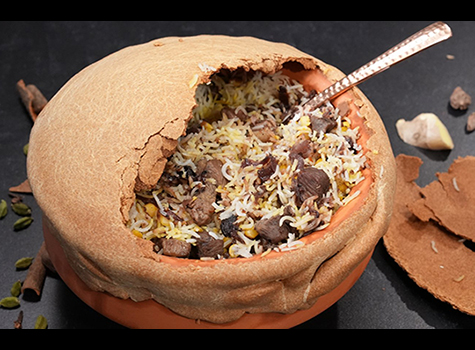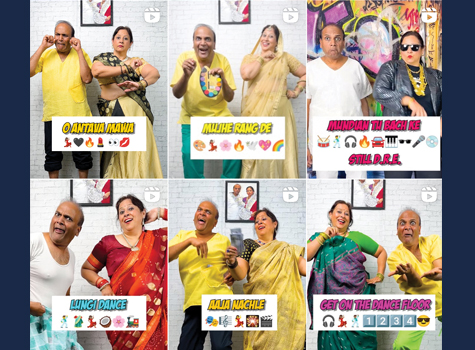
February was special to our family for many reasons, although Valentine’s Day was not one of them. For children it welcomed the occasion to celebrate Saraswati, the goddess of learning. The innocence of our youth nudged us to pray for good grades and request divine intervention when we desperately wanted to improve our rank in class. For foodies, it was the only time of the year that they could eat kul, (one of the many varieties of jujube) and enjoy its sweet and sour flavor.
Another opportunity to feast was the day of gota sheddho. Made with whole vegetables and greens, it is a dish made in slow cooking heaven. This Bengali harvest meal is unique because each family makes it according to their own recipe on the evening before Saraswati Puja and then it is allowed to cool overnight. After the long wait, the preparation is devoured the next day.
Mothers believe that this hearty meal will bring their children a long and healthy life. It has been years since I have tasted gota sheddho, but I remember it as one of the most delicious foods.
My quinoa salad from yesterday may have the same nutritional benefits but it cannot hold a candle to this. Regardless of their origin or significance, these traditions that we followed in the month of February, are etched in my mind. Traditions make events memorable, leaving us with a desire to continue them.
Regrettably, we often fail to carry them forward. For example, I haven’t introduced my children to either kul or gota sheddo. Sadly, the life that my husband and I started in the United States more than two decades ago, has taken us away from many customs that we were used to following particularly if they required foods that were rarely found in American stores.
It had snowed on my very first weekend in Charlotte. So, instead of flying kites in mid-January as we did in Mumbai, my husband and I enjoyed walking in the temporary winter wonderland. What a novel and magical experience! It was one that paved the way to a brand-new tradition for us. To this day, the rare snowfall in our area evokes the same attraction and we rush out with the kids in tow, to feel the snowflakes on our faces, form snow girls and angels.
This was followed by hot chocolate topped with marshmallow once we get indoors to rejoice the day off.
We have however, managed to salvage the long held Bengali tradition of making pithe – a sweet dumpling made with rice flour and filled with coconut thanks to our friend who hosts an annual get together to mark the occasion of Sankranti observed around the same time of year. Without her initiative, another custom would have fallen by the wayside.
For many, work schedules, competing household responsibilities, unsupportive spouses, or family members, can deter the continuation of some traditions. Not every convention must be retained, in fact, I am in favor of discarding those that are sexist or were historically based on prejudice or unfair beliefs.
The melting pot called America, is exemplary in the adoption of multicultural practices and giving it an American flavor. The Indian diaspora in this country has done a remarkable job of embracing new rituals while preserving key rituals from our heritage.
This speaks not only of the open mindedness and adaptability of this demographic but also of the strength of American marketing skills.
While some of the over commercialization of holiday products is grating, the excitement generated by shamrock merchandise, Valentine’s Day gift ideas and Diwali crafts is notable.
Christmas has evolved from a religious holiday to a social one. It is not uncommon to see grand Christmas trees in Hindu homes and desi delicacies being served alongside cookies and cakes at holiday soirees. And who can resist the myth of Santa and his elves that is fervently passed on from one’s kids to the grandkids.
Tradition is believed to be the antonym of innovation but that is not entirely true. Tradition and innovation are not mutually exclusive. For instance, cultural traditions are ever evolving, and we innovate to keep them alive.
The sordid past tied to the quintessentially American holiday of Thanksgiving may be enough reason to banish it but for immigrants whose families live oceans apart, an opportunity for friendsgiving – a gathering of friends who bond by sharing an autumn feast, is precious.
And, in a society where we are slowly learning that a woman’s worth is not defined by her marital status or ability to secure a romantic partner, Galentine’s Day recognizes the value of girlfriends in your life. Ones that offer you a shoulder to cry on and refrain from judgment at your worst moments.
In the face of a dramatically different world, the staunchest of ancient customs have become malleable. After initial efforts in India, and now rapidly around the world, women are emerging as official pujaris (priests) conducting Hindu rituals. The beauty of traditions is that they thrive through transmission from generation to generation, as well as the positive changes that occur in the process.
Shyama Parui is a long time North Carolina resident and an ardent writer. You can reach her at: shyamashree_parui@hotmail.com



